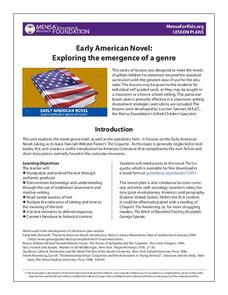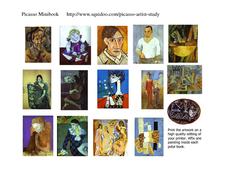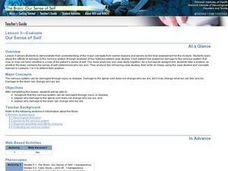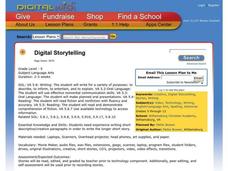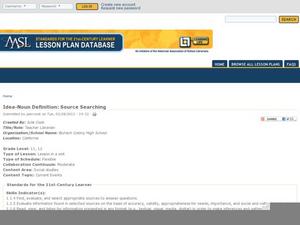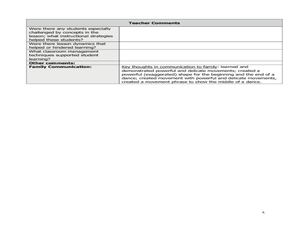MENSA Education & Research Foundation
Early American Novel: Exploring the Emergence of a Genre
Need an extra challenge for your best readers? Check out a unit that uses Hannah Webster Foster’s epistolary novel, The Coquette, published in 1797, as the anchor text. The resource is packed with project ideas; each with its own...
Curated OER
Picasso Minibook
Display knowledge about Pablo Picasso and his works with a folder book. Learners cut out images, paste them into tiny petal books, and then attach those onto folder pages. In the additional space, pupils write about the words of art.
New York State Education Department
English Language Arts Examination: August 2017
Reading and comprehending a poem is a lot different than doing the same for a piece of fiction or an informational text. As part of a sample English language arts examination, readers put their skills to the test by reading passages in...
Teaching Tolerance
Community Arts Showcase
An art showcase encourages class members to explore the themes of social justice and tolerance. They create an original artwork, engage in group discussions, and journal writing. The art gallery also provides a chance for families and...
Houghton Mifflin Harcourt
Practice Book: The Boy Who Saved Baseball
An array of reading comprehension, grammar, spelling, and vocabulary activities are at your fingertips with a language arts practice packet. Second, third, and fourth graders work on various skills using reading passages and word banks,...
University of Connecticut
Building Your Own Biosphere
On September 26, 1991, four women and four men entered the scientific experiment, Biosphere 2; the doors were sealed for two years in order to study the interactions of a biosphere. In the activity, scholars explore biospheres by...
EngageNY
Grade 10 ELA Module 4: Unit 3, Lesson 5
Would Machiavelli consider Macbeth a successful ruler? Scholars ponder the intriguing question, demonstrating their knowledge of Shakespeare's Macbeth and Machiavelli's The Prince. They collaborate with peers to share their opinions,...
Curated OER
Character Development Through Song
Learners use songs to analyze their sense of identity and self-worth. In groups, they discuss and explore their own character development and discover how far they have come in recent years. They also identify the positive and negative...
Curated OER
Using Aphorisms to Help Dealing with People
Here's a formal plan for what many effective teachers already do: Provide a week's worth of aphorisms and have learners choose one to write about in their journals each day. They reflect on the meaning of each aphorism and project how it...
Curated OER
Providing Effective Feedback to the Youngest of Writers
Primary grade children can excel as writers when presented with thoughtful and age-appropriate feedback.
Curated OER
It's About Time!
Students read a short tutorial and complete one or more online activities. They visit an online math dictionary to learn the value of a day, month, week, and year. In addition, they construct word problems based on a favorite month;...
Curated OER
Nervous System: Our Sense of Self
Students analyze the effects of damage to the nervous system by examining four fictitious patient cases. They discuss one case together and then individually write essays about the remaining cases
Curated OER
How Did I Do?
In this self evaluation worksheet, students use the rubric to grade themselves on a 4-3-2-1 scale. The rubric covers following directions, written work, pictures and effort.
Curated OER
Digital Storytelling
Sixth graders write a creative story and turn it into a digital storybook. In this digital storytelling lesson, 6th graders write a creative story, illustrate the story, and then use computer technology to turn their story and...
Curated OER
Check it Out...Nonfiction Can Be Fun!
Organizing information gathered for a research topic can be a challenge. Read aloud notes you have collected on a topic and use suggestions offer by the class to categorize and sort this information. Partners then follow this pattern,...
Curated OER
Idea-Noun Definition: Source Searching
A great idea for showing language arts pupils the universality of themes, even in the real world! Have class members choose an idea-noun (peace, justice, war, love, etc.) at the beginning of the year or semester. They complete weekly...
Curated OER
Michelle Kwan: Heart of a Champion
Who is a champion to your class? Elementary and middle schoolers think of a role-model from their lives. Then, in their journals, they write evidence of that person's perseverance. They identify the character trait of perseverance with...
Curated OER
Dance and Writing
Fourth graders use dance moves to perform narratives. In this dramatic performing lesson, 4th graders use strong and soft movements to show what character's voice is portraying. Students also use movement to show the feelings in the...
California Department of Education
How to Succeed in Life
Is it possible that six simple traits lead to a happy, successful life? Part four of a six-part series of college and career readiness lessons examines the effects of character in determining success. Working groups discuss...
University of Utah
Analyze and Solve Linear Equations
Solve any issues you have with solving linear equations. Learners solve linear equations in one variable, starting with two-step equations, in the first chapter of a 10-part eighth-grade workbook series. They then progress to equations...
Workforce Solutions
30 Seconds
Attention spans are short, but memories are long. Job seekers are challenged to develop a 30-second commercial that highlights their strengths in a job interview.
Curated OER
Double-Entry Journal Writing
Introduce your learners to the concept of a double-entry journal. Talk about how to connect with the text and model an example for them. Using whatever literature you are working with, have scholars choose a quote and make their own...
Iowa State University
A Model of Learning Objectives (Revision of Bloom's Taxonomy)
What would a three-dimensional representation of Bloom's revised taxonomy of the cognitive domain look like? Get a glimpse of the complex classification system that is frequently referenced in education to distinguish levels of learning.
EngageNY
Grade 9 ELA Module 3, Unit 2, Lesson 9
Part of being a strong researcher is knowing if you're headed in the right direction. Class members study their research frames formulated in the previous lessons of the unit and decide what parts of their inquiry paths need revision or...


